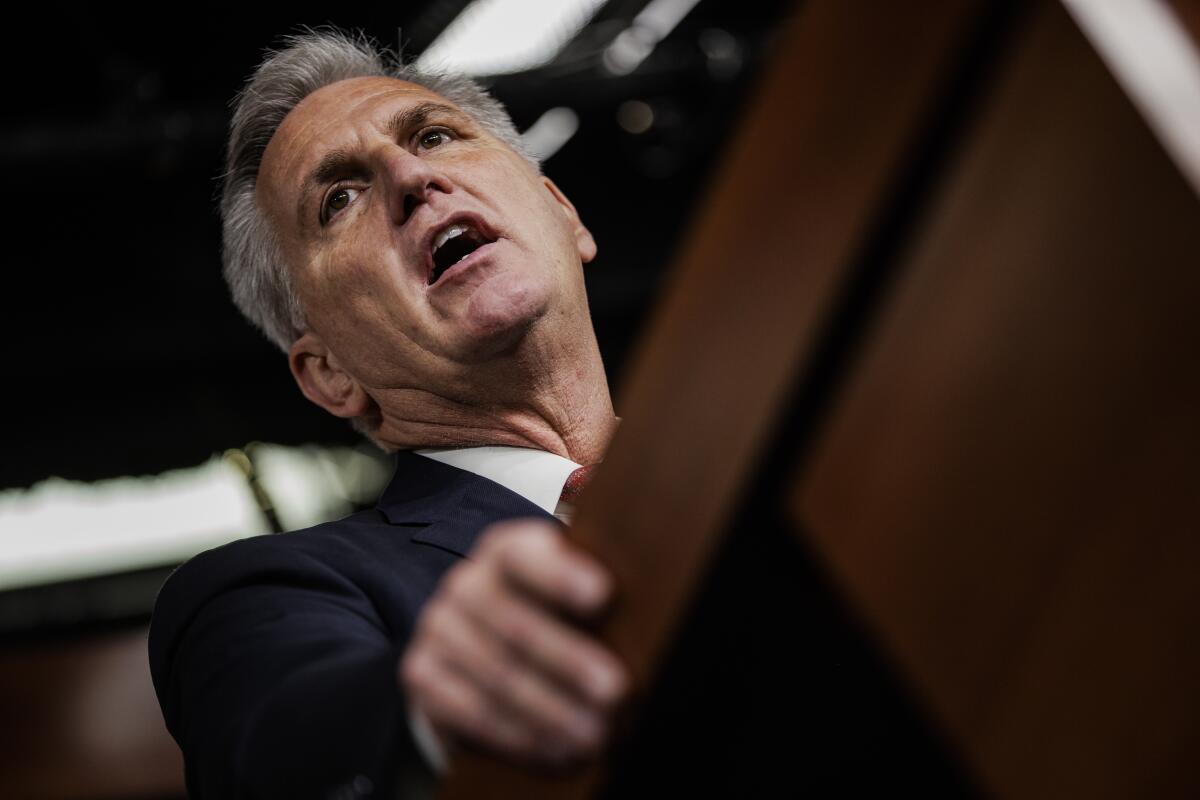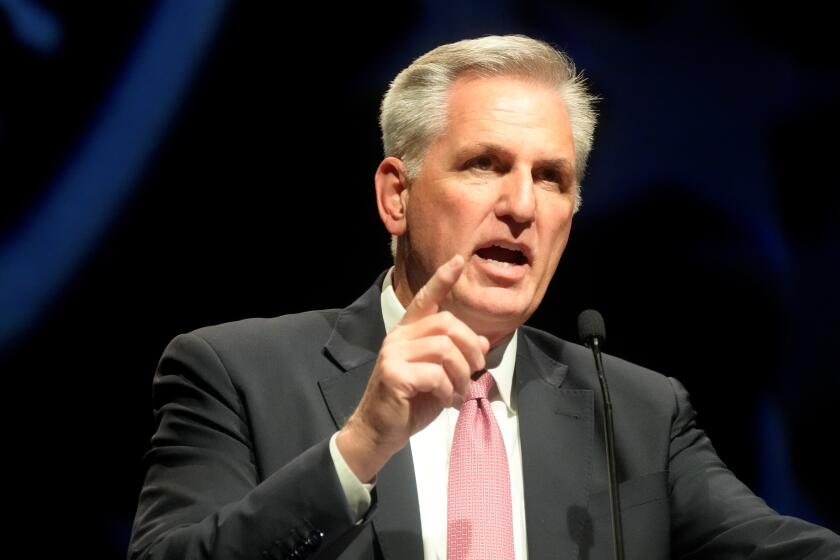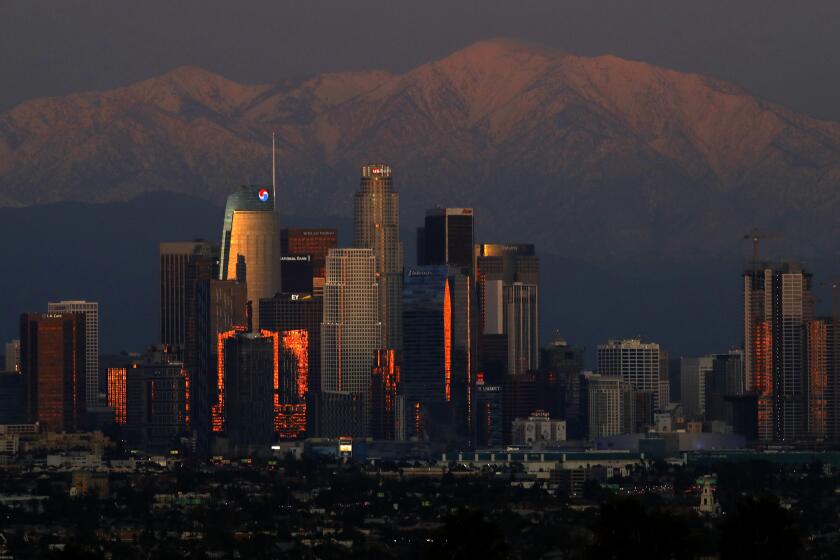Column: Is there anything Democrats and Republicans won’t fight about?

- Share via
It’s gotten to the point where even the most obviously nonpartisan issues that Americans ought to be able to address cooperatively and rationally have fallen victim to the country’s culture of extreme political polarization.
Hostility has grown so intense, especially on the Republican side, that subjects that should be entirely nonpolitical are now cause for bitter disagreement.
This past week, for instance, an article in The Times explained that the McKinney fire in Northern California — an equal opportunity catastrophe, for goodness’ sake, that burned tens of thousands of acres and killed four people — was being blamed by local residents on liberals.
Opinion Columnist
Nicholas Goldberg
Nicholas Goldberg served 11 years as editor of the editorial page and is a former editor of the Op-Ed page and Sunday Opinion section.
According to the story, residents attributed the fire less to the climate crisis than to bureaucratic red tape and a failure by Sacramento and Washington liberals to keep the interests of rural conservative northern Californians in mind.
Another piece of disturbing (yet hardly surprising) news last week was that the Inflation Reduction Act was approved by both houses of Congress without the backing of a single Republican senator or representative. According to my colleague Jackie Calmes, the bill was full of provisions that would benefit the party’s constituents and which they support. But Republicans in Washington, she said, have reached a point where they will vote down good, popular legislation simply to deny a victory to Democrats.
That’s a disservice to the country.
Then, because bad news comes in threes, there was a story in the New York Times that described how nearly two dozen state treasurers around the country — traditionally a sober and apolitical bunch whose job is to responsibly manage their state’s finances — have banded together and are coordinating their tactics to fight climate change programs and protect fossil fuel companies.
Yes, the two dozen are Republicans.
GOP leaders are deserting the rule of law and stoking dangerous disorder instead.
“There used to be a strong nonpartisan and bipartisan ethic among treasurers,” Robert Butkin, a former Oklahoma treasurer, told the New York Times. “But you’ve seen a lot of that erode over the past several years.”
Partisanship and polarization in American politics are nothing new, to put it mildly. And they have been growing for decades, going back well before the Trump era to the bruising battles over Robert Bork’s Supreme Court nomination and Newt Gingrich’s Contract With America. They have been exacerbated by social media, by partisan news networks, by the country’s regional divides and historical antipathies.
But the refusal to seek common ground on even the easiest, least political of issues is a particularly dangerous and depressing development.
While there’s certainly gamesmanship and obstructionism on both sides, the GOP is the greater offender.
A perfect example of this has been the COVID pandemic — in which a virus that doesn’t distinguish between Democrats and Republicans and has killed 6.4 million people around the world nevertheless became a political vehicle for simplistic GOP talking points.
Another example is climate change, which has been turned by Republicans (and the fossil fuel companies that love them) into a he said / she said in which scientific facts compete with misinformation for attention and solutions are stymied.
Even rally-round-the-flag events like last month’s assassination of Al Qaeda leader Ayman Zawahiri — the sort of thing that in the past would have brought liberals and conservatives together against a common enemy — became an opportunity for House Republican Leader Kevin McCarthy (R-Bakersfield) and his minions to bash Joe Biden’s “disastrous withdrawal” from Afghanistan last year.
Even before Ayman Zawahiri’s assassination, Al Qaeda was a weakened, regionalized terrorist organization.
“After September 11, 2001, all 535 members of Congress gathered on the steps of the Capitol the next day and sang ‘God Bless America,’” says Norman Ornstein, an emeritus scholar at the American Enterprise Institute in Washington. “If we had another 9/11 tomorrow, the Republicans would be in their offices writing impeachment memos or going on Fox News to say it was the president’s fault.”
At the root of the new tribalism, as Ornstein calls it, is the extraordinary (and growing) level of ill will between the two parties. The Pew Research Center says Democrats and Republicans today are farther apart ideologically than they’ve been in 50 years.
And it’s not just about issues; it’s personal. Democrats and Republicans increasingly see each other as more closed-minded, dishonest, immoral and unintelligent than other Americans, according to a Pew report released last week.
Perhaps most dramatically, 72% of Republicans now see Democrats as “a lot or somewhat more immoral” than other Americans, compared to 47% in 2016. Meanwhile, 63% of Democrats say Republicans are more immoral, up from 35% in 2016.
With such sky-high levels of rancor and disrespect, it’s hardly surprising that there’s a lack of cooperation. It’s no wonder we believe that if our political enemies support something, it must be bad, and that any victory for our adversaries is a defeat for us.
Americans have always had disagreements. We’ve fought over how to address poverty and racism and about the meanings of equality, justice and fairness in modern America. Touchy culture war questions have often divided us. It’s a shame, but perhaps unavoidable in a democracy.
For all the hand-wringing among U.S. conservatives that companies are imposing their liberal social agendas on workers and customers, a new study finds that top executives have become more Republican.
But we’ve also seen real efforts over the years to find meaningful legislative policy solutions in Congress between partisans such as Sens. Edward Kennedy (D-Mass.) and Orrin Hatch (R-Utah), Sen. Alan Simpson (R-Wyo.) and Rep. Romano Mazzoli (R-Ky.), and Sens. John McCain (R-Ariz.) and Russ Feingold (D-Wis.), to name just a few.
Today it’s a different world, as elected officials fight about things there should be no disagreement over, such as defending against wildfires and viruses, building roads and bridges, and transferring power peacefully after elections.
How much worse can it get? Might Republicans suddenly decide they’re tired of being forced by arrogant liberal Democrats to stop for red lights and decree that in the future they will stop only on green, while speeding forward on red?
That may sound like a joke, but I think it’s a not too crazy metaphor for a dysfunctional government.
More to Read
A cure for the common opinion
Get thought-provoking perspectives with our weekly newsletter.
You may occasionally receive promotional content from the Los Angeles Times.















